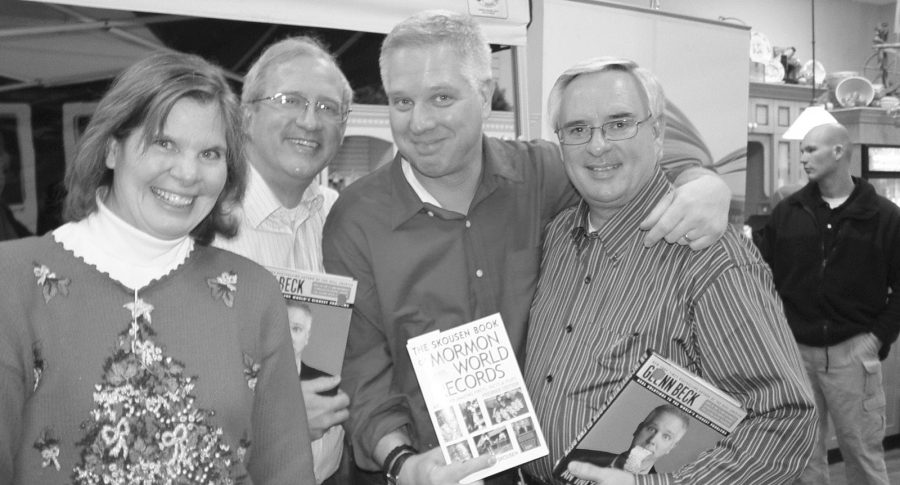A few weeks before organizing a massive rally on the Mall that had the feel of a reli¬gious revival, Glenn Beck sought the bless¬ing of some of the country’s most promi¬nent conservative Christian leaders. The Fox talk show host wanted their sup¬port as he shifted from political commen¬tary to a more spiritual message, he told the group of about 20. This is where God is leading me, Beck declared, according to Richard Land of the Southern Baptist Convention, who was there, along with Focus on the Family founder James Dobson. Land said most in the group found Beck’s faith genuine and heartfelt, although not everyone agreed to embrace him publicly. “We walked back to the hotel after and said, ‘That was extraordinary,’ ” Land said of his conversation with Dobson after the dinner in Manhattan. “I’ve never heard a cultural figure of that popularity talking that overtly about his faith. He sounded like Billy Graham.” Two days after Beck’s “Restoring Honor” rally drew a crowd that stretched from the Lincoln Memorial to the World War II Me¬morial, many Americans were still trying to figure out if the commentator had just seized the mantle of the religious right. Conservative Christian talk radio was crackling with debate about Beck’s Mor¬monism. Religious progressives were assail¬ing his attacks on President Barack Obama’s Christianity. Scholars of religion and poli¬tics were analyzing Beck’s evangelical-like talk of being saved from drug and alcohol addiction. Some pastor-bloggers were be¬moaning what they consider the conflation of celebrity, politics and spirituality. “Politically, everyone is with it, but theologically, when he says the country should turn back to God, the question is: Which God?” said Tom Tradup, vice president for news and talk at Salem Radio Network,which serves more than 2,000 sta¬tions, most of them Christian. “How much of this is turning to God? How much is re¬ligious revival and how much is a snake oil medicine show?” In a matter of hours, Beck went from a hugely popular media figure – a Gallup poll last year listed him as the fourth most ad¬mired living man in the country – to a spiri¬tual player, embracing a new and overtly religious rhetoric that made him sound like an evangelist. Yet the Mormon convert seems an unlike¬ly leader for conservative Christians, many of whom don’t regard Mormonism as part of their faith. Even as the event was billed as nonpartisan, and attendees were told not to bring political signs, it was impossible to untangle the Fox News commentator from the political anger of the “tea party” movement and the bitter 2010 campaign season. Republican leader Sarah Palin was one of his guest speakers and Beck was interviewed after the rally characterizing Obama’s faith as being dominated by an “oppressor-victim” paradigm. “People aren’t recognizing his version of Christianity,” Beck said on “Fox News Sunday.” It wasn’t the first time he had aimed withering criticism at Obama. In the days leading up to the rally, he described the president’s religious beliefs as “liberation theology” that represented “a perversion of the gospel of Jesus Christ as most Christians know it.” To those who embrace it, liberation theology is a means to empower the poor, the weak and politically oppressed. To some, Beck’s show of his faith was a calculated political effort to unite religious and social conservatives as the midterm elections approach. “No Republican is going to win the White House if those two aren’t united,” said D. Michael Lindsay, a Rice University sociologist who studies evangelical Protestant leaders. “Here’s a chance to infuse the tea party with religious rhetoric, and extend an olive branch to those not as engaged with financial issues.” Longtime Beck-watchers said he has always made references to his faith journey, his conversion from Catholicism to Mormonism, his crediting God with saving him from drug and alcohol abuse, professional obscurity and “friendlessness.” But in the run-up to Saturday’s rally, Beck talked publicly and privately about God working through him, calling a pre-rally event Friday “Divine Destiny” and lining up evangelical pastor John Hagee and other religious leaders to appear with him. “I’m a little nervous about that kind of talk,” said Janet Mefferd, a nationally syndicated Christian talk show host who said most callers Monday wanted to talk about Beck. “I know he means well and loves this country, but he doesn’t know enough about theology to know what kind of effect he’s having. Christians are hearing something different than what he thinks he’s saying.” Although he doesn’t consider Mormons to be Christians, Land said he agrees with Beck’s basic premise that American society must be “rebuilt from the bottom up.” Land accepted an invitation to be part of a group of more than 200 clergy members whom Beck calls his “Black Robed Regiment,” a reference to pastors from the Revolutionary War who stirred up opposition to colonial rule. Asked who would be considered conservative Christian leaders today – with Graham in his 90s and the recent death of Jerry Falwell – Land said that “leaders are leaders because people follow them. Obviously, Glenn Beck is a leader. He’s in a category by himself. He’s not a minister, he’s not a politician.” Conservative Christian leaders of the future, he said, are less likely to be clergy members, because it’s harder to be an overt partisan and keep your tax-exempt status. Among those considered top leaders, he said, are former Arkansas Gov. Mike Huckabee (R) and Louisiana Gov. Bobby Jindal (R). This isn’t the first time Beck’s faith has been scrutinized. Prominent Mormons have occasionally criticized him as being an entertainer, not a theologian. After an interview in 2008 with Focus on the Family, the article was pulled because some of the group’s supporters thought it was wrongly validating his conversion experience.
Glenn Beck May Be Unlikely Leader For Conservative Christians
By Michelle Boorstein
| September 14, 2010
| September 14, 2010

